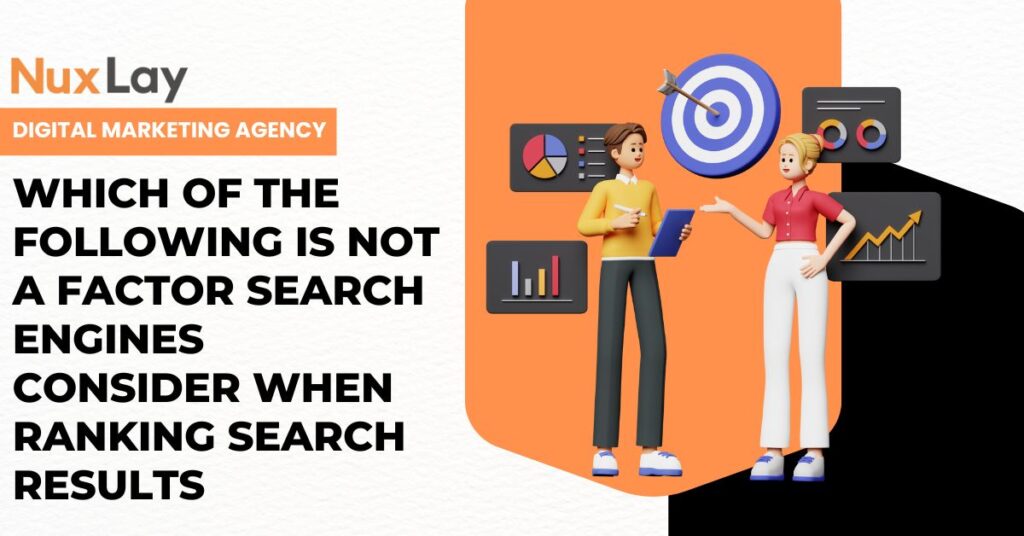Search engine optimization (SEO) is often regarded as the lifeblood of digital marketing. It influences visibility, website traffic, user engagement, and, ultimately, business success. Businesses aiming to rise in Google’s search results must follow best practices that align with search engine algorithms. But in this vast landscape of SEO, a question often arises: “Which of the following is not a factor search engines consider when ranking search results?”
Understanding what matters to search engines — and more importantly, what doesn’t — is crucial. Many digital marketers waste time and resources optimizing aspects that don’t directly influence rankings. In this blog, we’ll unravel the critical SEO ranking factors, debunk the myths, and guide you on how to refine your digital strategy for long-term success.
Table of Contents
The Core Function of Search Engines
Search engines like Google, Bing, and Yahoo serve one primary goal: to deliver the most relevant and high-quality results to users’ queries. To accomplish this, they use complex algorithms that analyze a myriad of ranking factors. These include content quality, backlinks, mobile-friendliness, user intent, page speed, and more. Understanding what these algorithms prioritize helps businesses and digital agencies like NuxLay Digital Agency develop data-driven SEO strategies.
However, while the list of known ranking factors is long, it’s equally important to understand what is not considered in ranking. This helps streamline SEO efforts and avoid wasting valuable resources.
Key SEO Ranking Factors: What Search Engines Do Consider
Before we identify what doesn’t impact rankings, let’s explore what does. Here are some critical factors search engines evaluate when determining your position in search results:
1. High-Quality Content:
Content remains king. Search engines prioritize pages that are original, well-written, and provide valuable information relevant to the user’s query. Keyword placement, semantic relevance, and content structure all play a role.
2. Backlinks:
Backlinks from reputable sources signal credibility and authority to search engines. A site with quality backlinks is more likely to rank higher than one without.
3. Mobile Optimization:
With mobile-first indexing, Google now evaluates the mobile version of a site for ranking purposes. A site that’s not mobile-friendly will likely struggle to rank well.
4. Page Speed:
Slow-loading websites provide a poor user experience. Google’s algorithm considers page speed, especially on mobile, as a key ranking signal.
5. Secure HTTPS Protocol:
Security matters. Websites with HTTPS encryption are favored over non-secure HTTP sites.
6. User Engagement Signals:
Click-through rate, bounce rate, and time on page help search engines determine how users interact with a website, which in turn can influence ranking.
7. On-Page SEO Elements:
Proper use of header tags, image alt text, internal linking, and meta descriptions enhance both user experience and crawlability.
8. Technical SEO:
Proper URL structure, schema markup, crawlable content, and XML sitemaps contribute to improved rankings.
Debunking the Myths: Which of the Following Is Not a Factor Search Engines Consider When Ranking Search Results?
Despite the clear-cut factors above, many myths and misconceptions continue to circulate. Let’s address the question directly:
“Which of the following is not a factor search engines consider when ranking search results?”
Here are a few commonly misunderstood elements that do not directly influence rankings:
1. Social Media Likes or Follower Counts:
Contrary to popular belief, having a million followers on Instagram or thousands of likes on Facebook posts doesn’t directly influence your website’s ranking on search engines. While social media can drive traffic, the platforms themselves don’t feed into Google’s ranking algorithm.
2. Paid Advertising (Google Ads):
Running paid ads on Google does not directly affect organic search rankings. Organic SEO and PPC (Pay-Per-Click) are distinct channels, and one does not inherently benefit the other in algorithmic rankings.
3. Meta Keywords Tag:
Once a staple in SEO, the meta keywords tag is now completely ignored by Google. Using it will neither hurt nor help your rankings.
4. Domain Age (After a Certain Threshold):
While a brand-new site may take time to gain trust, once a domain has been established for a few months, its age doesn’t significantly impact rankings. It’s the quality of content and backlinks that matter more.
5. Using Google Services (e.g., Gmail, Google Analytics):
Having a Gmail account or using Google Analytics doesn’t give your website preferential treatment. Google has stated this explicitly to maintain the integrity of its search engine.
6. Bounce Rate Alone:
While user behavior metrics are considered in context, bounce rate by itself doesn’t provide enough insight for search engines to judge a page’s quality or relevance. High bounce rates aren’t always negative — think of a user who finds the answer immediately and leaves.
By identifying these non-factors, brands can stop spending time on unnecessary SEO tasks and focus on elements that truly matter.
Why Misunderstanding SEO Hurts Businesses
When businesses chase after non-factors, they dilute their resources. Time spent optimizing social media likes or obsessing over meta keywords could be better spent producing valuable content or improving website speed. Misguided SEO efforts not only waste time but can also create poor user experiences — which in turn do hurt rankings.
Additionally, misunderstanding SEO can cause businesses to become overly reliant on shortcuts or outdated strategies. This often leads to penalties, lower visibility, and a damaged online presence. It’s essential to rely on up-to-date information and professional support.
How NuxLay Digital Agency Helps You Focus on What Matters
At NuxLay Digital Agency, we specialize in delivering focused, strategic SEO solutions that align with current search engine algorithms. We understand that staying ahead in the SEO game means adapting, learning, and making data-driven decisions.
Rather than chasing myths or non-factors, NuxLay emphasizes what search engines actually value. We:
- Conduct comprehensive keyword and competitor research
- Develop content strategies based on user intent and semantic relevance
- Improve technical SEO and site architecture for better crawlability
- Focus on building authentic backlinks
- Optimize user experience and engagement metrics
Whether you’re a startup or an established brand, NuxLay Digital Agency empowers your business by deploying real SEO strategies — not myths. We offer transparency, performance tracking, and a results-first approach that ensures you’re always ranking for the right reasons.
Our approach saves time, maximizes ROI, and enhances your brand’s visibility in a competitive digital landscape. We don’t rely on gimmicks. We build SEO strategies based on what truly works, and we’re proud to be a trusted digital partner for businesses across industries.
Real-World Examples: Where Businesses Go Wrong
Let’s explore a couple of real-life scenarios that highlight the importance of knowing what is — and isn’t — an SEO ranking factor.
Example 1: Business A Invests in Social Media Likes
This business pours time and budget into boosting Instagram likes, hoping it will drive higher rankings. However, despite a strong social media presence, their website rankings remain unchanged. Why? Because search engines don’t factor in Instagram likes or Twitter followers when ranking websites.
Example 2: Business B Optimizes for Meta Keywords
An eCommerce site uses the outdated meta keywords tag in all its product pages. After weeks of implementation, they see no improvement in organic traffic. Again, the issue lies in optimizing for something that Google stopped considering over a decade ago.
In contrast, businesses working with NuxLay Digital Agency avoid these pitfalls by leveraging updated SEO strategies rooted in real data and industry best practices.
SEO Strategy That Works: Focus Areas for 2025 and Beyond
As algorithms evolve, staying informed about what matters is more important than ever. Here’s where businesses should direct their SEO focus:
- E-E-A-T (Experience, Expertise, Authoritativeness, Trustworthiness): Google continues to push the importance of trustworthy and credible content.
- Core Web Vitals: These metrics assess real-world page experience, including load speed, interactivity, and visual stability.
- Search Intent Optimization: Aligning content with what users are actually looking for is more critical than just targeting keywords.
- AI and Semantic Search: Understanding how AI interprets content can give you an edge in future-focused SEO.
By aligning your strategy with these evolving factors and avoiding outdated non-factors, your business will maintain its visibility and relevance across search engines.
Final Thoughts
The digital landscape is crowded and competitive. The difference between a top-ranking site and one buried on page three often comes down to how well you understand search engine behavior. Knowing which of the following is not a factor search engines consider when ranking search results? helps clarify where your focus should lie.
Avoid the pitfalls of outdated tactics. Embrace a forward-thinking SEO strategy built on real factors that influence rankings. And if you need a trusted partner on this journey, NuxLay Digital Agency is here to help.
We combine deep industry knowledge with actionable insights, helping your business rise in search engine rankings — ethically, efficiently, and effectively. Let NuxLay power your SEO journey with clarity and purpose.






